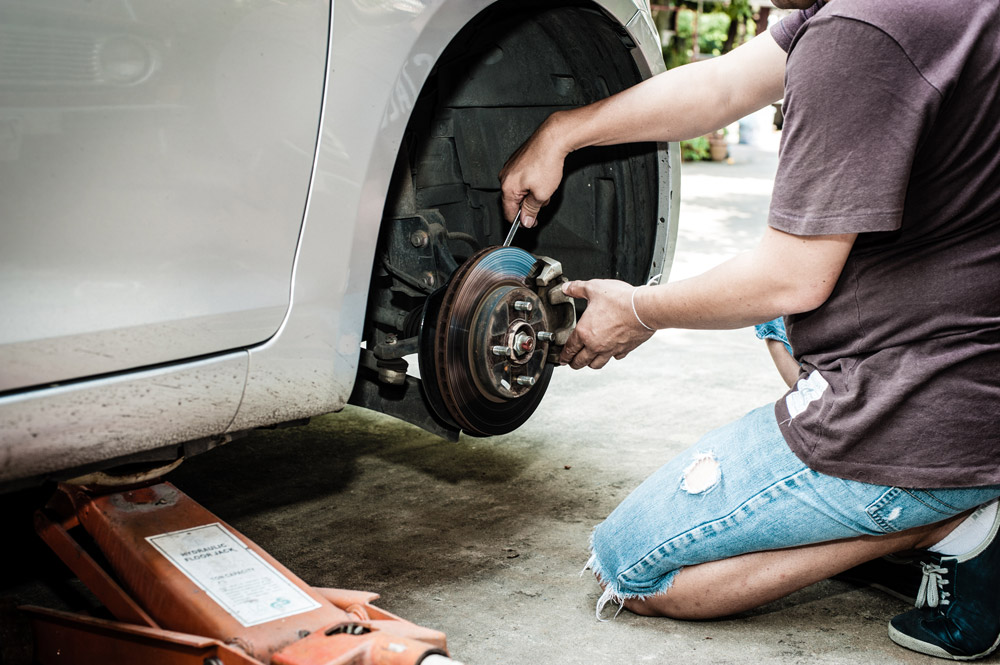
Taking Matters Into Your Own Hands
It’s a scenario that is as old as cars themselves: a vehicle in need of a car repair, hood open, out on the driveway; the man or woman of the house, sleeves rolled up, wrench in hand; a toolbox, a canister of car fluid, and a few oily rags on the ground nearby. For as long as we’ve had cars, we’ve been taking matters into our own hands.
Today, however, the situation is somewhat different. Far more people question whether they have the skills necessary to fix their car themselves, or whether they need to call their South Salt Lake Master Muffler to have our team take a look at it. This question isn’t a sign of weakness, though. There are numerous pros and cons to being a DIY mechanic.
Let’s take a look at a few of them.
To Do or Not to Do
Much like the old Volkswagen Beetle, some cars are designed for the DIY-er in mind; their simple designs and common components make them a favorite of high school mechanic classes everywhere. But here in Utah, we drive all sorts of vehicles. Is it worth trying our hand at car repairs, ourselves?
The Pros
All Those Good Feelings
Some repairs can be taught easier than others and offer a real sense of accomplishment when completed. There also may be some mental health benefits involved. Experts have discussed how working on one’s own car can not only give you a healthy hobby but also reduce your stress.
- You aren’t left wondering what’s wrong with your vehicle.
- You don’t feel powerless as you allow car repair professionals to do work you don’t understand.
- You get to feel relieved that you aren’t one of the 77% of vehicles on the road that currently need maintenance.
There’s something to be said for taking control of what you can control in a relatively low-stakes environment. When you go to the garage and spend your time in your own way, working on your car, all those good feelings will come to you.
Learn More About Your Vehicle
There’s something to be said about learning by doing. While many people might feel the desire to grab a how-to book off the shelf and learn about their car by reading, eventually they will need to venture into the garage and get their hands dirty. Most people who are stressed talking to a mechanic feel that way because they aren’t exactly sure what is wrong with their car or what needs to be done. By working on your own car, that fear will leave you.
You will also have better context for the sounds and smells that your car is giving off. For instance:
- A burning smell is usually a sign of low motor oil which allows parts to grind together until they’re hot. A sweet smell, on the other hand, could be coolant leaking into the radiator.
- A rattling sound, like a tin can full of quarters, means something is loose, while a popping sound means that something is wrong with your exhaust system — perhaps a catalytic converter failure.
The Cons
You May Invalidate Your Warranty
Car manufacturers are a lot like electronics manufacturers — if you fiddle with their product on your own, instead of sending it back to them or having a professional take care of it, then you’ll void your warranty the next time there’s an issue.
Before taking on any DIY project, consult your car’s warranty and figure out if there are any issues with you not being a licensed mechanic. If you’re unsure about what type of warranty you have, or what options you’re left with once that warranty expires, we’ve written about this as well.
You Might Not Have What You Need
The caveat in doing everything yourself, instead of bringing the vehicle to our South Salt Lake car repair center, is that the job needs to be done all the way and correctly. To do otherwise would be unsafe and unprofitable. This puts pressure on you to have all the tools and expertise you need for some of the bigger jobs, which many laypersons may not have.
There are some repair jobs that really should be left to the professionals, not only for the time it will save you but also for the sake of your safety. At Master Muffler, we are proficient in all types of car repair, with an emphasis on:
- Mufflers and exhaust
- HVAC systems
- Catalytic converters
- Engine repairs
If you think that any one of these might need repairing, drop on by our garage and we’ll get you sorted out quickly and efficiently.
Related Posts
Key Takeaways On average, passenger vehicle tires last 40,000 to 60,000 miles, depending on type, driving habits, and maintenance. Replace tires when tread depth reaches 2/32”, if damaged, or older than 10 years. Regular rotation, alignment, and proper inflation extend tire life. Aggressive driving, poor roads, and harsh weather shorten tire lifespan. Take advantage [...]
When you think about car maintenance, you probably focus on oil changes, tire rotations, and maybe even brake pad replacement. But what about your brake fluid? If you’ve ever wondered, “What does brake fluid do?” or “Why is brake fluid important?”, you’re not alone. Brake fluid might not be the most talked-about part of [...]
Is that high-pitched squeal from your brakes driving you—and everyone else—crazy? Don’t ignore it. Squeaky brakes aren’t just annoying, they’re your car’s way of saying something needs attention. Whether you're cruising through Salt Lake City or winding up Idaho’s mountain passes, here’s what’s likely going on, how you can fix it, and when it [...]





